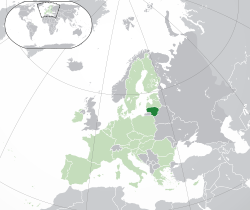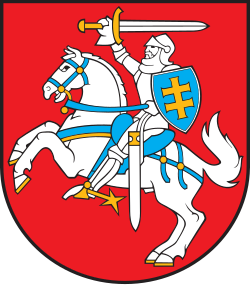Municipalities of Lithuania
 From Wikipedia - Reading time: 15 min
From Wikipedia - Reading time: 15 min
This article includes a list of general references, but it lacks sufficient corresponding inline citations. (November 2021) |


 |
|---|
|
|
 |
| Administrative divisions of Lithuania |
|---|
|
Counties Municipalities Elderships Sub-elderships |
| Geocodes of Lithuania |
|
|
Lithuania is divided into three levels of administrative divisions. The first-level division consists of 10 counties (Lithuanian: singular – apskritis, plural – apskritys). These are sub-divided into 60 municipalities (Lithuanian: plural – savivaldybės, singular – savivaldybė), which in turn are further sub-divided into over 500 smaller groups, known as elderships (Lithuanian: plural – seniūnijos, singular – seniūnija).
At the end of its tenure as a Soviet Socialist Republic, Lithuania's administrative divisions consisted of 44 regions, 12 cities, 80 towns, 19 settlements, and 426 rural districts.[1] The reform of this system was an immediate concern for the new government.[2] The Constitution of Lithuania, ratified in 1992, delegated the power of establishing future administrative units to the Lithuanian Parliament (Seimas). Accordingly, the Seimas passed two fundamental laws: a 1993 law on government representation and a 1994 law specifying the territorial-administrative units and their boundaries.[2] The current system of a set of municipalities under 10 counties was codified by 1995.[2] Several changes were made in 2000, resulting in 60 municipalities.[3]
Ordinary municipal councilors are elected every four years from electoral lists using proportional representation. The mayor, who used to be a member of the council until 2023,[4] is elected directly by the residents using the two-round system since 2015 reforms.[5] Before then, the mayors were elected by the municipal councils.
The largest municipality by population in Lithuania is Vilnius City Municipality with 593,436 residents, home to one fifth (20.7%) of the country's population. The smallest municipality by population is Neringa Municipality with 4,173 (0.1%) residents.[6]
The largest municipality by land area is Varėna District Municipality, which spans 2,216 km2 (856 sq mi), while the smallest is Alytus City Municipality at 40 km2 (15 sq mi).
Powers and functions
[edit]Municipalities are established to perform certain functions provided by law. According to the abovementioned Republic of Lithuania Law on Local Self-Government, the functions of municipalities are "functions related to local government, public administration and provision of public services defined by the Constitution and attributed to municipalities by this and other laws". The processes of integration into international organizations - like the EU and NATO - are considered to be important external factors influencing the development of municipal powers in the country. Lithuania, which has become a member of these organizations, has been assigned completely new responsibilities, some of which, naturally, also belonged to municipalities. In the case of EU integration, municipalities have been assigned the necessary information supply to the European Commission, and in the case of integration into NATO, municipalities have had new functions related to security issues.

Municipalities
[edit]As of January 1, 2024.[7]
See also
[edit]- Administrative divisions of Lithuania
- Counties (Lithuanian: singular – apskritis, plural – apskritys)
- Elderships (Lithuanian: plural – seniūnijos, singular – seniūnija).
- Seniūnaitija (sub-eldership)
- Cities (Lithuanian: plural – miestai, singular – miestas)
- Towns (Lithuanian: plural – miesteliai, singular – miestelis)
Notes and references
[edit]- Notes
- References
- ^ Conference on Local and Regional Authority Co-operation in the Baltic Sea Area: proceedings, Kaunas, Lithuania, 21-23, April 1999. Council of Europe. January 2000. p. 9. ISBN 978-92-871-4538-3. Retrieved 16 February 2011.
- ^ a b c Jolanta Vaičiūnienė (2008-11-14). "The Administrative–Territorial Reform in Lithuania: History and Today" (PDF). Council of Europe. Retrieved 16 February 2011.
- ^ Local Economic and Employment Development (Program); Organisation for Economic Co-operation and Development (April 2007). Baltic partnerships: integration, growth and local governance in the Baltic Sea Region. OECD Publishing. p. 75. ISBN 978-92-64-02928-6. Retrieved 23 February 2011.
- ^ Skėrytė, Jūratė (14 March 2023). "Apžvalga: naujai išrinktiems merams – didesni įgaliojimai". LRT (in Lithuanian). Retrieved 20 March 2024.
- ^ "Law on elections to municipal councils". The Seimas of the Republic of Lithuania. Retrieved 31 July 2015.
- ^ "Resident population on 1 July". osp.stat.gov.lt. 2023-08-07.
- ^ a b "Area (land) at the beginning of the year, Population density at the beginning of the year, Resident population at the beginning of the year". Statistics Lithuania. Retrieved 1 March 2024.
- ^ Municipality administrative centers and coats of arms are given by Statistics Lithuania in subpages under the Portrait of the Regions of Lithuania; e.g. Alytus town municipality Archived 2011-05-26 at the Wayback Machine.
Sources
[edit]- "Law on the Territorial Administrative Units and Their Boundaries". Lietuvos Respublikos Seimas. 30 March 2010. Retrieved 28 September 2011.
 KSF
KSF















